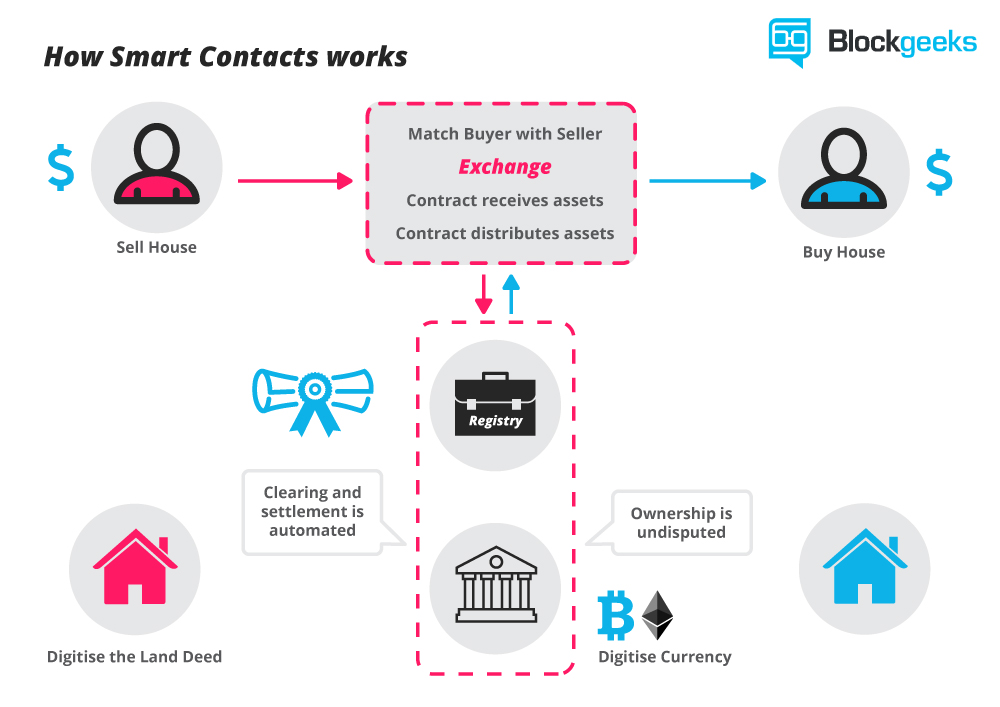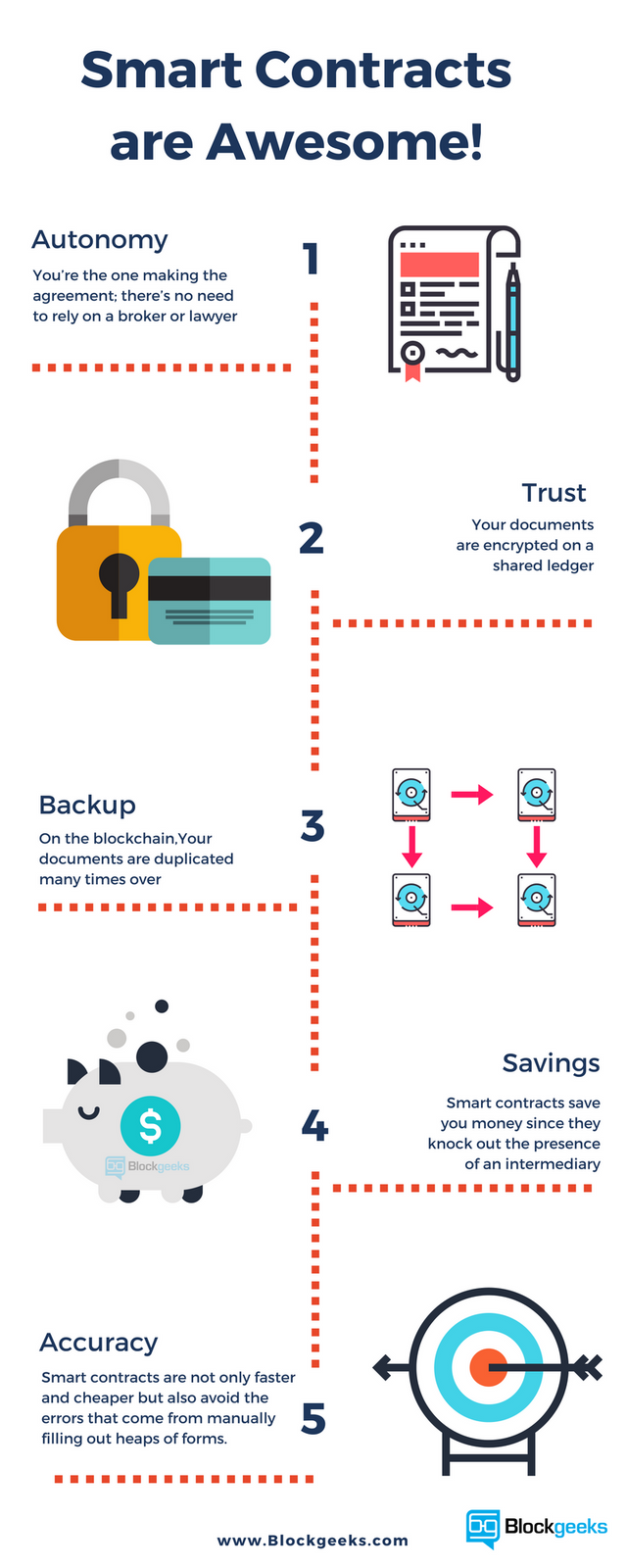Smart Contracts Explained!
Welcome to Smart Contracts fellow steemians!
Nex here with a new subject to cover this time - something i'm not really sure but I tried my best at gathering info.

One of the best things about the blockchain is that, because it is a decentralized system that exists between all permitted parties, there’s no need to pay intermediaries – the so called middle men - and it saves you time and conflict.
Blockchains are supposed to be faster, cheaper, and more secure than traditional systems, which is why banks and governments are turning to them – in the EU Syrian refugees were given money via Ethereum!
20 years or so ago, Nick Szabo, a legal scholar, and cryptographer, realized that the decentralized ledger could be used for smart contracts, otherwise called self-executing contracts, blockchain contracts, or digital contracts.
In this format, contracts could be converted to computer code, stored and replicated on the system and supervised by the network of computers that run the blockchain.
This would also result in ledger feedback such as transferring money and receiving the product or service – thus ensuring transparency.
So you might ask - what are Smart Contracts?
Smart contracts help you exchange money, property, shares, or anything of value in a transparent, conflict-free way, while avoiding the services of a middleman – which translates to a cheaper service.
The best way to describe smart contracts is to compare the technology to a vending machine.
Ordinarily, you would go to a lawyer or a notary, pay them, and wait while you get the document, right?
With smart contracts, you simply drop a bitcoin into the vending machine (i.e. ledger), and your escrow, driver’s license, or whatever drops into your account.
More so, smart contracts not only define the rules and penalties around an agreement in the same way that a traditional contract does, but also automatically enforce those obligations – that means no human error or acting of ill will.
Vitalik Buterin, the 22-year-old programmer of Ethereum – in case some of you might not know- explained that in a smart contract approach, an asset or currency is transferred into a program “and the program runs this code and at some point it automatically validates a condition and it automatically determines whether the asset should go to one person or back to the other person, or whether it should be immediately refunded to the person who sent it or some combination thereof.”
In the meantime, the decentralized ledger also stores and replicates the document which gives it a certain security and immutability.
Example – Extracted directly out of Blockgeeks Says, Ethereum CTO, Gavin Wood: Nex signing off - Kisses and Hugs! If you guys liked this post or love us - you know can check below: Follow, Resteem and UPVOTE @plainbroadcast the Mining Project for Cryptonews and Mining TIPS! Every week we will top vote our donations and we will look for some way to pay you guys back! :) ETH: 0x50047f79dd2D3035eF8eE3A3d9D5A74777801507 STEEM: STM8k1rqZWQhiZWvR7QXgRPAGYw6NyrvrQ5uJwDsYKo4NXxvuuKebw BTS: plainbroadcast BTC: 13PAD9NX8oVX3Sn1QyU6MHNTLF7C4gdTVR SIA: 5d2c502cfbfb6eba1596aca4629c8d9696d554520ec3612088516334e02bc6941238dc9d8f78 Dash: XbPqKoCxVJNNBfgX8iEPdWrSqa8cM7BGUm Doge: DKouXL5Y8nqHLCJvq8b5gfaBwHyqiUbQH1 Golem: 0xEE9FFe7912704C43F0375C60b202a86c0A9e02C7 Litecoin: LfgDJgT48L8P1SrPCoZEyut3BNYnuJxbK9 Augur: 0xEE9FFe7912704C43F0375C60b202a86c0A9e02C7
Suppose you rent an apartment from me. You can do this through the blockchain by paying in cryptocurrency. You get a receipt which is held in our virtual contract; I give you the digital entry key which comes to you by a specified date. If the key doesn’t come on time, the blockchain releases a refund.
If I send the key before the rental date, the function holds it releasing both the fee and key to you and me respectively when the date arrives. The system works on the If-Then premise and is witnessed by hundreds of people, so you can expect a faultless delivery.
If I give you the key, I’m sure to be paid. If you send a certain amount in bitcoins, you receive the key. The document is automatically cancelled after the time, and the code cannot be interfered by either of us without the other knowing, since all participants are simultaneously alerted.
You can use smart contracts for all sort of situations that range from financial derivatives to insurance premiums, breach contracts, property law, credit enforcement, financial services, legal processes and crowd funding agreements.
Here’s How You Can Use Smart Contracts
Jerry Cuomo, vice president for blockchain technologies at IBM, believes smart contracts can be used all across the chain from financial services to healthcare to insurance. Here are some examples:
Government
Insiders vouch that it is extremely hard for our voting system to be rigged, but nonetheless, smart contracts would allay all concerns by providing an infinitely more secure system. Ledger-protected votes would need to be decoded and require excessive computing power to access.
No one has that much computing power, thus making it extremely secure and secondly, smart contracts could hike low voter turnout.
Much of the inertia comes from a fumbling system that includes lining up, showing your identity, and completing forms.
With smart contracts, volunteers can transfer voting online and thus everyone will be able to vote without leaving their own home!
Management
The blockchain not only provides a single ledger as source of trust, but also avoids possible snarls in communication and workflow because of its accuracy, transparency, and automated system.
Ordinarily, business operations have to endure a back-and forth, while waiting for approvals and for internal or external issues to sort themselves out.
A blockchain ledger streamlines this. It also cuts out discrepancies that typically occur with independent processing and that may lead to costly lawsuits and settlement delays – no more having to ask your superior, and their superior to their superior… and so on.
Supply Chain
Smart contracts work on the If-Then premise so as Jeff Garzik’s said,
“UPS can execute contracts that say, ‘If I receive cash on delivery at this location in a developing, emerging market, then this other [product], many, many links up the supply chain, will trigger a supplier creating a new item since the existing item was just delivered in that developing market.’”
All too often, supply chains are hampered by paper-based systems, where forms have to pass through numerous channels for approval, which increases exposure to loss and fraud. The blockchain nullifies this by providing a secure, accessible digital version to all parties on the chain and automates tasks and payment.
Automobile
Think of a future where everything is automated – your house, your car, even most of the day to day boring tasks.
One example is the self-autonomous or self-parking vehicles, where smart contracts could put into play a sort of ‘oracle’ that could detect who was at fault in a crash; the sensor or the driver, as well as countless other variables.
Using smart contracts, an automobile insurance company could charge rates differently based on where, and under which, conditions customers are operating their vehicles.
Healthcare
Personal health records could be encoded and stored on the blockchain with a private key which would grant access only to specific individuals.
The same strategy could be used to ensure that research is conducted via HIPAA laws (in a secure and confidential way).
Receipts of surgeries could be stored on a blockchain and automatically sent to insurance providers as proof-of-delivery.
The ledger, too, could be used for general health care management, such as supervising drugs, regulation compliance, testing results, and managing healthcare supplies.
Smart Contracts are Awesome!

Here’s how a smart contract empowers you:
Autonomy – You’re the one making the agreement; there’s no need to rely on a broker, lawyer or other intermediaries to confirm.
Incidentally, this also knocks out the danger of manipulation by a third party, since execution is managed automatically by the network, rather than by one or more, possibly biased, individuals who may commit fraud or be mistaken.
Trust – Your documents are encrypted on a shared ledger. There’s no way that someone can say they lost it if everyone has access to it.
Backup – Imagine if your bank lost your savings account. On the blockchain, each and every one of your friends has your back. Your documents are duplicated many times over.
Safety – Cryptography, the encryption of websites, keeps your documents safe. There is no hacking. In fact, it would take an abnormally smart group of hackers to crack the code and infiltrate – which could be simply reversed.
Speed – You’d ordinarily have to spend chunks of time and paperwork to manually process documents – I’m looking at you IRS.
Smart contracts use software code to automate tasks, thereby shaving hours off a range of business processes.
Savings – Smart contracts save you money since they knock out the presence of an intermediary. You would, for instance, have to pay a notary to witness your transaction.
Accuracy – Automated contracts are not only faster and cheaper but also avoid the errors that come from manually filling out heaps of forms – and also avoids fraud.
Jeff Garzik, owner of blockchain services Bloq, described smart contracts as follows:
“Smart contracts … guarantee a very, very specific set of outcomes. There’s never any confusion and there’s never any need for litigation.”
But blockchain is FAR from perfect.
Smart contracts still have a way to go to reach perfectness.
What if bugs get in the code? Or how should governments regulate such contracts?
Should governs even regulate such contracts?
Or, how would governments tax these smart contract transactions?
As a case in point, remember the rental situation?
What happens if I send the wrong code, or, as lawyer Bill Marino points out, I send the right code, but my apartment is condemned (i.e., taken for public use without my consent) before the rental date arrives?
If this were the traditional contract, I could rescind it in court, but the blockchain is a different situation.
The contract performs, no matter what.
The list of challenges goes on and on. Experts are trying to unravel them, but these critical issues do dissuade potential adopters from signing on.
And finally, Blockchains Where You Can Process Smart Contracts:
Bitcoin: Bitcoin is great for processing bitcoin transactions, but has limited ability for processing documents.
Side Chains: This is another name for blockchains that run adjacent to Bitcoin and offer more scope for processing contracts.
NXT: NXT is a public blockchain platform that contain a limited selection of templates for smart contracts. You have to use what is given; you’re unable to code your own.
Ethereum: Ethereum is a public blockchain platform and the most advanced for coding and processing smart contracts. You can code whatever you wish, but would have to pay for compute power with “ETH” tokens.
As to the potential of smart contracts itself, there’s no end to the range of industries it can impact, from healthcare to automobile to real estate and law. The list goes on and on.
“The potential for [smart contracts] to alter aspects of society is of significant magnitude. This is something that would provide a technical basis for all sorts of social changes, and I find that exciting.”
Wanna fund the project?
good article - smart contracts will come on strong in 2017
Thanks! I'm hoping that we work together to make the world a better place - from mining to smart contracts we may actually make a difference someday!
you bet - followed you
Great explenation lots of info!
Thank you kindly! I will try to do more and cover deeper as we grow in understanding!